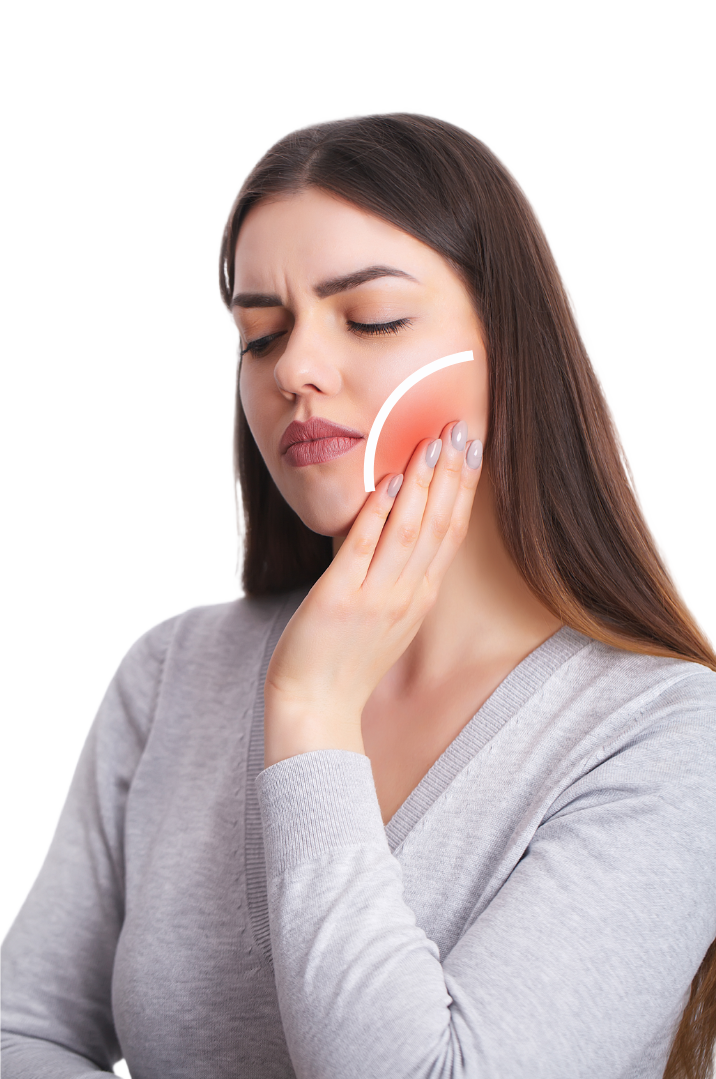Temporomandibular Joint Disorder
About Temporomandibular Joint Disorder
Temporo-Mandibular Joint (TMJ) syndrome or disorder is the term given to painful conditions relating to jaw movement and pain in and around the jaw joints. It infers inflammation of the sliding joints that connects the jawbone and the skull called the temporomandibular joint. It is a disorder that causes pain from any form of jaw movement such as eating or talking. The causes may include referred pain arising from occipital neuralgia to nerve hypersensitivity of the surrounding nerves. Even a neck condition can give rise to TMJ pain.
What Causes Temporomandibular Joint Disorder?
Multiple factors contribute to the muscle tightness and dysfunction of this condition. The most common cause is muscle tension. When faced with stress, you may clench your jaws or grind your teeth, over time, it results in muscle spasms, sore muscles or various complications.
Some possible risk factors for TMJ are as follows:
- Bruxism
- Poor posture of the neck
- Stress
- Women of childbearing age
- Menopausal syndrome
- Chronic inflammatory arthritis / History of Jaw Trauma
- Genetic predisposition

What Causes Temporomandibular Joint Disorder?
Multiple factors contribute to the muscle tightness and dysfunction of this condition. The most common cause is muscle tension. When faced with stress, you may clench your jaws or grind your teeth, over time, it results in muscle spasms, sore muscles or various complications.
Some possible risk factors for TMJ are as follows:
- Bruxism
- Poor posture of the neck
- Stress
- Women of childbearing age
- Menopausal syndrome
- Chronic inflammatory arthritis / History of Jaw Trauma
- Genetic predisposition
Symptoms Of Temporomandibular Joint Disorder
Patients may experience a variety of symptoms such as:
- Jaw pain
- Difficulty in opening your mouth
- Clicking, popping, or grating sounds in the jaw area when opening or closing your mouth
- Tinnitus
- Difficulty in chewing
- Toothache
When Should You Seek Medical Care?
If you’ve been experiencing any of the symptoms listed above such as jaw pain, difficulty in opening your mouth, clicking and popping of the jaw, it is recommended to visit a doctor right away. You should also schedule an appointment if you grind or clench your teeth.
A Message About TMJ Disorder
The pain from your jaw might not seem serious, especially if it comes and goes. But when left untreated, TMJ dysfunction can seriously impair daily functions like biting, chewing, and speaking.
TMJ pain can be distressing and affects one’s quality of life. The constant pain and the episodic pain flare may be irrespective of any triggers such as opening or closing of the jaw. Many sufferers may even sacrifice their good teeth thinking it is a tooth problem.
This is a complex pain condition that needs a thorough evaluation of local and surrounding structures. Sometimes, if attended to early, it may resolve with a simple solution such as a mouth guard/brace (splints). However, many may need specialised injections to stop the pain generator.
Diagnosing Temporomandibular Joint Disorder
At Singapore Paincare clinics, our team of experienced primary care and pain care specialists together with a dental specialist will conduct a thorough diagnosis by evaluating your medical history and doing a physical examination of your jaw region. If it remains inconclusive, X-rays and MRI scans may be used to investigate the causes of your pain.
What Treatments Are Available for Temporomandibular Joint Disorder?
At Singapore Paincare, we strive to treat your pain with the least invasive option possible after accurately identifying the cause. Our approach to pain resolution focuses on the removal of pain generators via specialised injection and minimally invasive procedures. Combined with pharmacological treatments and cognitive and physical rehabilitative therapies, we help patients improve functions and prevent pain from recurring.
Non-Surgical Treatments for Temporomandibular Joint Disorders
Splints
Myospan Injections
Platelet Rich Plasma Injections are used to improve the healing and recovery of fatigued and overused joints. Alternatively, we offer Botulinum Toxin injections to relieve jaw tension and pain. Apart from providing long-lasting pain relief, the benefits include balancing the face, eliminating headaches and immediate relief.
Physical and Strengthening Therapy
Surgical Treatments for Temporomandibular Joint Disorders
In desperation to get relief for TMJ pain, some may seek immediate surgery. However, conservative methods should be the first line of treatment. As surgery always comes with associated risks, complications, and downtime – it may not be suitable for everyone. Surgery often does not achieve a favourable outcome and it is not recommended.
Arthrocentesis
Arthroscopy
Open-joint surgery
How Can I Prevent Temporomandibular Joint Disorder?
While some TMJ symptoms are caused by factors out of your control like having a misaligned bite. In some cases, you may be able to reduce the risk of TMJ dysfunction by:
- Wearing a night guard
- Practicing good posture
- Wearing a protective mouthguard when playing contact sports
- Practicing relaxation and reducing your stress level
Get Your Pain Resolved
Send your enquiries or consult our pain experts today.


